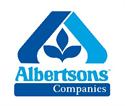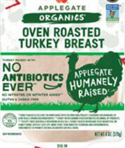Companies
Albertsons Extends Organic And Natural Foods Lines To Online Market
 Privately-owned grocery chain Albertsons has launched an Instacart-powered virtual store offering organic and natural foods and beverages. According to the Idaho-based company, the O Organics Market will be available at first in Washington, D.C., and San Francisco, Calif., but will expand to other locations in the future. The online market will carry more than 3,800 items from the O Organics, Open Nature, and other organic and natural brands available in its stores, which include Safeway, Albertsons, Vons, Jewel-Osco, Acme, Shaw’s, and United Supermarkets, among others. [Image Credit: © Albertsons Companies]
Privately-owned grocery chain Albertsons has launched an Instacart-powered virtual store offering organic and natural foods and beverages. According to the Idaho-based company, the O Organics Market will be available at first in Washington, D.C., and San Francisco, Calif., but will expand to other locations in the future. The online market will carry more than 3,800 items from the O Organics, Open Nature, and other organic and natural brands available in its stores, which include Safeway, Albertsons, Vons, Jewel-Osco, Acme, Shaw’s, and United Supermarkets, among others. [Image Credit: © Albertsons Companies]
US Foods Cleans Up Four Of Its Product Lines
.png&width=125&height=116) U.S. Foods Holding Corp. announced that four of its product lines will be produced with clean label profiles. The Metro Deli, Rykoff Sexton, Chefs Line, and Stock Yards Exclusive Brand products will be made with simple, more recognizable ingredients by avoiding, removing or replacing ingredients and food additives found on the company’s new “Unpronounceables List.” The list comprises more than 80 ingredients the company will avoid using in more than 1,000 of its Exclusive Brand products. Product ingredient labels across the four best-quality Exclusive Brands will now be free of ingredients such as artificial flavors, artificial (FD&C) colors, high-fructose corn syrup, disodium guanylate, sodium benzoate, and monosodium glutamate. [Image Credit: © US Foods]
U.S. Foods Holding Corp. announced that four of its product lines will be produced with clean label profiles. The Metro Deli, Rykoff Sexton, Chefs Line, and Stock Yards Exclusive Brand products will be made with simple, more recognizable ingredients by avoiding, removing or replacing ingredients and food additives found on the company’s new “Unpronounceables List.” The list comprises more than 80 ingredients the company will avoid using in more than 1,000 of its Exclusive Brand products. Product ingredient labels across the four best-quality Exclusive Brands will now be free of ingredients such as artificial flavors, artificial (FD&C) colors, high-fructose corn syrup, disodium guanylate, sodium benzoate, and monosodium glutamate. [Image Credit: © US Foods]
Calif. Court Rules Acrylamide Warning On Breakfast Cereals Not Necessary
 A California appeals court has ruled that healthful whole grains trump potential cancer-causing chemicals when it comes to food labeling. The court said breakfast cereals like Cheerios and Grape-Nuts Flakes do not have to put a warning label about a chemical ingredient that may cause cancer under the state's Proposition 65, because the labels could discourage consumers from buying healthful foods. The cereals contain the chemical acrylamide, but so do other foods, the court said, including peanut butter, rye and whole wheat bread, sunflower seeds, and prune juice. [Image Credit: © Amin | Wikimedia Commons]
A California appeals court has ruled that healthful whole grains trump potential cancer-causing chemicals when it comes to food labeling. The court said breakfast cereals like Cheerios and Grape-Nuts Flakes do not have to put a warning label about a chemical ingredient that may cause cancer under the state's Proposition 65, because the labels could discourage consumers from buying healthful foods. The cereals contain the chemical acrylamide, but so do other foods, the court said, including peanut butter, rye and whole wheat bread, sunflower seeds, and prune juice. [Image Credit: © Amin | Wikimedia Commons]
Next Major Food Trend Could Be “Allergen-Free”
 Companies that sell foods that claim to not only be gluten-free but free of other ingredients that trigger allergic reactions expect solid growth over the coming years. Chicago’s Enjoy Life Foods, for example, saw an opportunity when the U.S. FDA designated eight common food allergens, including peanuts and gluten. The company has seen double-digit growth every year since 2011. No one is really tracking the allergen-free market yet, so there are no reliable measures of it. But the rate of anaphylactic reactions to food increased 377 percent between 2007 and 2016. Another company, Safe + Fair, says its chocolate chip cookie is free of nuts, but does contain wheat, egg and soy. The company, which recently completed a $10 million Series C funding round, is developing a line of nut-free cookies and crackers called Skeeter Snacks. [Image Credit: © Aney | Wikimedia Commons]
Companies that sell foods that claim to not only be gluten-free but free of other ingredients that trigger allergic reactions expect solid growth over the coming years. Chicago’s Enjoy Life Foods, for example, saw an opportunity when the U.S. FDA designated eight common food allergens, including peanuts and gluten. The company has seen double-digit growth every year since 2011. No one is really tracking the allergen-free market yet, so there are no reliable measures of it. But the rate of anaphylactic reactions to food increased 377 percent between 2007 and 2016. Another company, Safe + Fair, says its chocolate chip cookie is free of nuts, but does contain wheat, egg and soy. The company, which recently completed a $10 million Series C funding round, is developing a line of nut-free cookies and crackers called Skeeter Snacks. [Image Credit: © Aney | Wikimedia Commons]
Court Squashes Suits Seeking Human Rights Disclosure Labels On Foods
A federal appeals court has ruled that California consumer laws do not require food companies to put disclaimer labels about supply-chain issues on their products. The 9th circuit court’s decision ends class action suits that have sought to force companies to disclose possible human rights violations within the supply chain. The U.S. Department of Labor has reported that forced child labor occurs in the harvesting of cocoa beans in the Ivory Coast and the collection of fish and shrimp in Thailand. Companies such as Mars and Nestlé have acknowledged that such abuses occur, but plaintiffs in the class action suits say such efforts do not go far enough.
Hormel Removes Carrageenan From Line Of Natural, Organic Deli Meats
 Hormel’s Applegate brand of natural and organic meats announced it has eliminated the controversial ingredient carrageenan from its deli meat products after consumers complained about it. Carrageenan is a sulfated polysaccharide derived from seaweed that is used as a thickener and stabilizer in foods. The USDA now allows the use of carrageenan in natural and organic foods. Hormel also requires a no-antibiotics policy on the farms that produce meats for its Applegate products. [Image Credit: © Hormel]
Hormel’s Applegate brand of natural and organic meats announced it has eliminated the controversial ingredient carrageenan from its deli meat products after consumers complained about it. Carrageenan is a sulfated polysaccharide derived from seaweed that is used as a thickener and stabilizer in foods. The USDA now allows the use of carrageenan in natural and organic foods. Hormel also requires a no-antibiotics policy on the farms that produce meats for its Applegate products. [Image Credit: © Hormel]
NRDC: Beef, Pork Producers, Fast-Food Chains, Should Reduce Antibiotics Use
 The Natural Resources Defense Council is happy that poultry producers and fast-food chains are weaning themselves from chickens raised with human antibiotics, but wonder why beef and pork are ”another story.” Progress in the chicken industry is “in stark contrast” to what’s happening with pigs and cattle. In fact, according to the NRDC, pretty much the same amount of medically important antibiotics is sold for use in pigs as for use in treating sick people in the U.S. But pork producers in many countries raise pigs without routine use of antibiotics. Beef producers represented by the U.S. Roundtable for Sustainable Beef (USRSB) – which also includes fast-food chains – are also falling short when it comes to antibiotics use. “It is time to clean up antibiotic use practices behind the beef and pork served on [fast-food] menus,” the Council said. [Image Credit: © Stephen Fulljames | Wikimedia Commons]
The Natural Resources Defense Council is happy that poultry producers and fast-food chains are weaning themselves from chickens raised with human antibiotics, but wonder why beef and pork are ”another story.” Progress in the chicken industry is “in stark contrast” to what’s happening with pigs and cattle. In fact, according to the NRDC, pretty much the same amount of medically important antibiotics is sold for use in pigs as for use in treating sick people in the U.S. But pork producers in many countries raise pigs without routine use of antibiotics. Beef producers represented by the U.S. Roundtable for Sustainable Beef (USRSB) – which also includes fast-food chains – are also falling short when it comes to antibiotics use. “It is time to clean up antibiotic use practices behind the beef and pork served on [fast-food] menus,” the Council said. [Image Credit: © Stephen Fulljames | Wikimedia Commons]
Australian Exporters Hope To Exploit U.S. Love Of Grass-Fed Beef
 Australian grass-fed beef exporters see a niche market in the U.S. as American producers face mounting beef, pork, and poultry supplies that could soon export suppress prices. The demand for chilled grass-fed beef is being driven by Millennials looking for “all natural” protein supplies. Since 2012, Australia’s grass-fed beef trade with the U.S. has increased 100 percent, and now represents 25 percent of total volume shipped there, the second largest beef market after Japan. The grass-fed, HGP-free, antibiotic-free product range is a fast-growing,albeit competitive, niche in the U.S. The sale of meat with natural claims has a CAGR of four percent, while meat labeled hormone- and antibiotic-free is growing at nine percent. [Image Credit: © redjar – jared benedict | Wikimedia Commons]
Australian grass-fed beef exporters see a niche market in the U.S. as American producers face mounting beef, pork, and poultry supplies that could soon export suppress prices. The demand for chilled grass-fed beef is being driven by Millennials looking for “all natural” protein supplies. Since 2012, Australia’s grass-fed beef trade with the U.S. has increased 100 percent, and now represents 25 percent of total volume shipped there, the second largest beef market after Japan. The grass-fed, HGP-free, antibiotic-free product range is a fast-growing,albeit competitive, niche in the U.S. The sale of meat with natural claims has a CAGR of four percent, while meat labeled hormone- and antibiotic-free is growing at nine percent. [Image Credit: © redjar – jared benedict | Wikimedia Commons]
Regulators, Organic Industry, Work To Shore Up Labeling Standards
 Though organic food represents only five percent of total U.S. food sales, the $45 billion industry is large enough to be experiencing growing pains, including fraudulent and slack labelling practices. The problem is causing consumers to wonder whether the USDA organic label is worth paying premium prices. The USDA says it’s working to fix label issues involving imported foods, as well as questionable practices within the egg and dairy industries. The agency hopes to step up inspections, coordinate with other agencies, and implement technologies to better track products across global supply chains. The Organic Trade Association, meanwhile, says it's testing ways to detect fraud and, once fine-tuned, will share the methods with its membership. [Image Credit: © USDA | Wikimedia Commons]
Though organic food represents only five percent of total U.S. food sales, the $45 billion industry is large enough to be experiencing growing pains, including fraudulent and slack labelling practices. The problem is causing consumers to wonder whether the USDA organic label is worth paying premium prices. The USDA says it’s working to fix label issues involving imported foods, as well as questionable practices within the egg and dairy industries. The agency hopes to step up inspections, coordinate with other agencies, and implement technologies to better track products across global supply chains. The Organic Trade Association, meanwhile, says it's testing ways to detect fraud and, once fine-tuned, will share the methods with its membership. [Image Credit: © USDA | Wikimedia Commons]
Copyright 2026 Business360, Inc.

